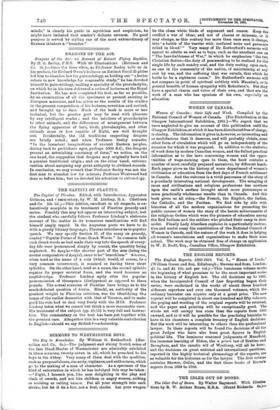THE CAPTIVI OF PLAUTUS.
The Captivi of Plautus. Edited, with Introduction, Apparatus Criticus, and Commentary, by W. M. Lindsay, M.A. (Methuen and Co. 10s. 6d.)—This edition, excellent in all respects, is ex- haustively complete in its treatment of Plautine prosody and metre. Possibly this may not appear an interesting subject, but the student who carefully follows Professor Lindsay's elaborate account of the matter in its numerous ramifications will find himself amply repaid. In the Augustan poets we have to do with a purely literary language ; Plautus introduces us to popular speech. We may specify Section II. of the essay on prosody, headed " Popular Forms of Some Greek Words." In common talk such Greek words as had made their way into the speech of every- day life were pronounced simply by accent, the quantity being neglected. So fipaxioy=, the shorter part of the arm (being the neuter comparative of Boax4s), came to be" bracchIam." .."Xerros, when used as the name of a coin (which would, of course, be a very common occurrence), is scanned as having three short syllables. On the other hand, used as a name, the second syllable regains its proper metrical force, and the word becomes an amphibrachys. Professor Lindsay aptly cites the popular pronunciation of threepence (threppence) as opposed to three pounds. The actual scansion of Plautine lines brings U3 to the much-debated question of hiatus. Ritschl, an authority of the greatest weight in Plautine criticism, was for identifying th e usage of the earlier dramatist with that of Terence, and to make good his rule had to deal very freely with the MSS. Professor Lindsay takes what we cannot but think a more reasonable view. His treatment of the subject (pp. 43-55) is very full and instruc- tive. The commentary on the text has been put together with the greatest care. Altogether this is a very valuable contribution to English—should we say British P—scholarship.


























































 Previous page
Previous page